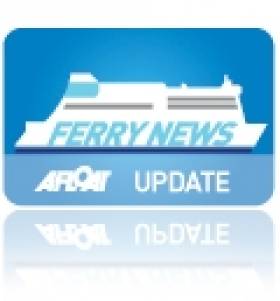Displaying items by tag: Olau Hollandia
Winds of Change face former Fastnet Ferry and Sistership
#FERRY NEWS - With the acquisition of Fastnet Line's Julia to C-BED as previously reported, the Dutch owned company's fleet rises to three floating hotels which are used to accommodate workers in offshore wind-farm energy installations, writes Jehan Ashmore.
All three vessels are former ferries and one of which the Wind Ambition was in recent years based in in the north Irish Sea. The third vessel is Wind Solution, for photos and technicl details of these vessels click HERE. While the former Cork-Swansea ferry has been renamed Wind Perfection (1981/22,161grt) , she remains berthed in Cork city docks having laid-up there since the route's closure last November.
The vessel is however due to undergo an extensive refit in The Netherlands before she takes up a charter in the North Sea with Siemens in October, as a floating hotel for wind-turbine industry employees.
By using the vessel Siemens are to save valuable time and money which would otherwise by the daily transfer of construction workers to and from the mainland. For a video computer simulation showing the different logistics involved between an offshore floating hotel and a conventional hotel onshore, click HERE.
Wind Perfection was originally built as Olau Britannia and shared sailings with sistership Olau Hollandia for a UK-Dutch route between Sheerness-Vlissingen operated by Olau Line.
The sisters were replaced by newer vessels on the North Sea route in the late 1980's and sold to various owners during the years. Before Julia made her Celtic Sea debut, she last ran under the same name for Stella Line on the St. Petersberg-Helsinki route.
Incidentally her sister Norlandia (1981/21,473grt) operates also from the Finnish capital to Tallinn for Eckero Line. Likewise she too is due to undergo changes as she is to be replaced later this year as a second-hand ferry from Mediterranean owners was sold to the Baltic Sea operator.
- Ferry news
- Fastnet Line
- CBed
- Celtic Sea ferry operator Fastnet Line
- Olau Line
- Julia
- Olau Britannia
- Olau Hollandia
- CorkSwansea
- Stella Lines
- Siemens
- Ports and Shipping News
- Irish Sea ferry news
- Eckero Line
- Nordlandia
- HelsinkiTallinn
- Wind Perfection
- Wind Ambition
- Wind Solution
- Offshore Floating Hotels
- WindFarm Instalations
- North Sea windfarms





























































